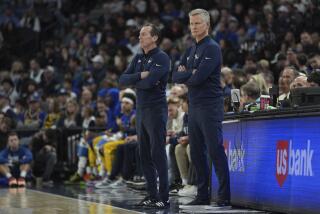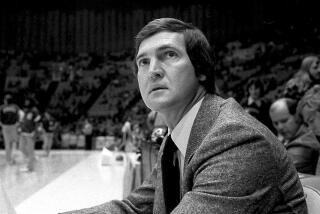COAST TO COAST
Shinn shouldn’t get away Scott-free
It was obvious 2008 coach of the year Byron Scott was in trouble, but firing him in nine games was fast even for Hornets owner/bailout king George Shinn.
Now if Coach/General Manager Jeff Bower (read: we owe Byron $5 million, so let’s combine jobs, even if we have to hire former USC -- and Hornets -- coach Tim Floyd to show him what to do) can’t turn them around, there goes the illusion the problem is anything but their ragtag selves.
Is there any way this could be a bigger disaster?
How about if Chris Paul was not only surprised, but upset?
“I felt like maybe somebody would have at least consulted with me and asked how I felt before it happened,” Paul told the New Orleans Times-Picayune’s John Reid.
“Coach was always honest with you. He was always straightforward with you from day one.”
Unfortunately, while Paul stood with Scott, everyone else muttered darkly, starting with David West (“What we had wasn’t working”).
For sure, West wasn’t working, averaging 15 points and 5.4 rebounds, down from last season’s 21 and 8.5.
Last season they slid seven games in the standings from their 2007-08 No. 2 finish in the West, and management grumbled that Scott didn’t work hard enough.
Actually, Scott’s problem was booting them to No. 2, letting them think they were that good.
Scott now gets a year off with pay and will receive offers -- and if he happens to be free whenever Phil Jackson retires, he’s still blood brothers with Kobe Bryant and Magic Johnson.
Paul is that much closer to the door, as a 2012 free agent -- or sooner if they bow to the obvious and get what they can for him.
This season will show how obvious it is, but Shinn, who hot-footed it out of Charlotte, has wrecked better teams and likelier markets than this.
--
Life after skyhooks
It’s amazing what it takes to make an athlete a person, rather than a hero (who makes your team win), or a villain (who makes someone else’s win).
There were few like Kareem Abdul-Jabbar, whose excellence was manifest but whose forbidding persona didn’t leave him with his choice of post-career opportunities.
So he made his own, showing a generosity of spirit as great as his need for space.
Abdul-Jabbar has written six books about the forgotten and disadvantaged.
He speaks on behalf of causes, such as in last spring’s appearance at the Florida Holocaust Museum, where he told Richard Lapchick, himself a pioneer in asserting ethical standards in sports, “It is important that African Americans and Jewish Americans understand their common history, especially at the beginning of the early civil rights movement.
“Jews supported what African Americans were trying to achieve in attempts to attain equality. Jewish lawyers worked for the NAACP and played a key role.”
Of course, getting leukemia does it every time.
For anyone who hadn’t seen it (roughly 99.9% of the world’s population), Abdul-Jabbar made the rounds of the morning TV shows, talking about his illness and showing how engaging he can be.
His prognosis is hopeful, which is good.
At 62, he has done a lot more than mentor Andrew Bynum, showing what a life can be and making it precious to more people than him.
-- Mark Heisler
More to Read
Go beyond the scoreboard
Get the latest on L.A.'s teams in the daily Sports Report newsletter.
You may occasionally receive promotional content from the Los Angeles Times.










